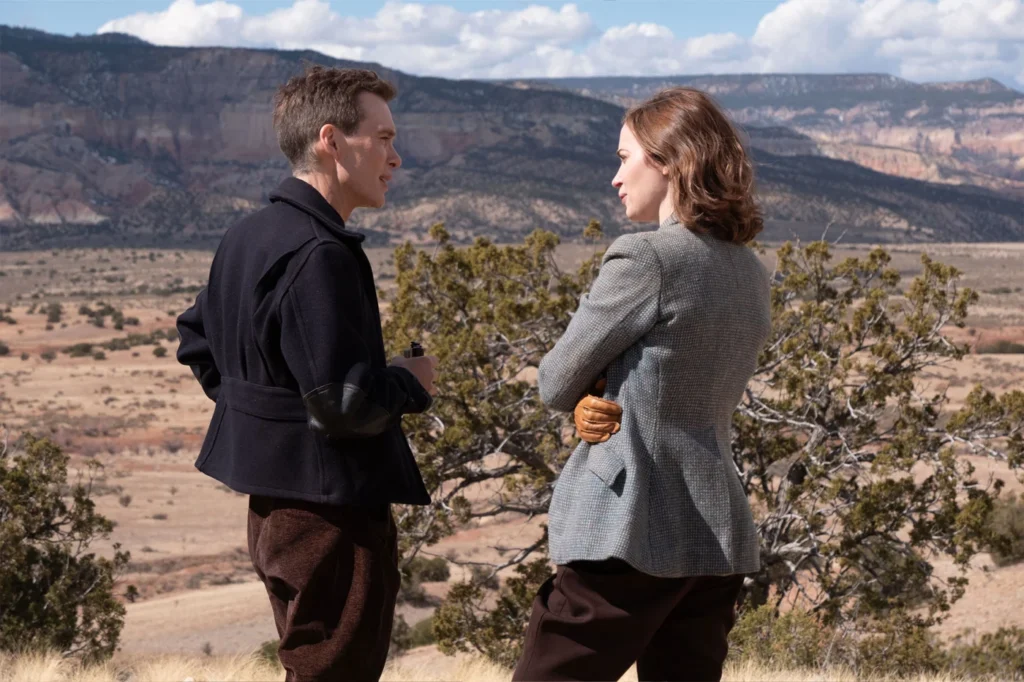Just as Christopher Nolan’s “Tenet” buoyed me during quarantine, his “Oppenheimer” (1) became one of my lifelines during another harrowing year. I needed “Oppenheimer”—its earth-and-sky scope, its ruthless “I believe we did” honesty, its wounded but enduring romanticism. “Kitty and I, we’re grownups,” J. Robert Oppenheimer (Cillian Murphy) says of his wife, Katherine (Emily Blunt). “We’ve walked through fire together.” I have loved Mr. Nolan’s films since before I was a grownup, and they’re still guiding me through the fire.
It breaks my heart that the protagonists of “Past Lives” (2) don’t end up together (yes, I’m #TeamHaeSung). Yet despite its tear-soaked ending, writer-director Celine Song’s debut film showed me what love could be—on trains, along waterfronts, in restaurants, on a sidewalk as an Uber balefully waits to depart. Achingly clear-eyed and wrenchingly romantic, the movie’s emotions are exquisitely etched on the faces of actors Greta Lee and Teo Yoo, who embody a love at once fleeting and eternal.

Ethan Hunt, secret agent…he’s just like us: A citizen of a technological dystopia, a witness to democracy’s decline, a mourner of lost loves. Still, Hunt—played, as always, with high-wire sincerity by Tom Cruise—gets on with it in Christopher McQuarrie’s “Mission: Impossible – Dead Reckoning” (3), whether he’s dashing through a labyrinthine airport, battering through a Venice bacchanal, or racing across the oil-slicked floor of a tumbling train car. His daredevil heroics may never truly save us, but they can certainly delight us.
There’s no way the accountants at Lionsgate Films will let the avenging assassin John Wick (Keanu Reeves) stay dead (this year, the series passed $1 billion at the international box office). But that doesn’t change the fact that in Chad Stahelski’s “John Wick: Chapter 4” (4), he dies well—at sunrise on the seemingly endless steps of Sacré-Cœur Basilica, after a satisfyingly long and bloody quest that plays like a brutally luminous dream.

Here’s a New Year’s resolution for cinephiles: Stop taking Ridley Scott for granted. Concluding an unofficial history-as-farce trilogy that began with “The Last Duel” and “House of Gucci,” the 86-year-old British director packed “Napoleon” (5) with both majesty and mischief, wrangling not only robust battles, but Joaquin Phoenix’s magnificently buffoonish Emperor and Vanessa Kirby’s deliciously imperious Joséphine. The whole endeavor is, however, a supreme work of historical fan fiction. Just so ya know.
In Mia Hansen-Løve’s “One Fine Morning” (6), la vie d’Sandra (Léa Seydoux) is defined by single motherhood, her father’s neurogenerative disease, and the marriage of her paramour (Melvil Poupaud) to another woman. Immune to the comfort of self-care, Sandra reacts, listens, endures. Through her, we experience agonizing repression and restraint, yet discover a world where the simplest gestures—like a hand placed gently on your back—can create an earthquake of joy.

Trysts and betrayals abound when a sophisticated Japanese couple (Aoba Kawai and Ryuta Okamoto) announce their engagement in “Passion” (7), a 2008 provocation from writer-director Ryusuke Hamaguchi (“Drive My Car”) that finally made it to American screens in 2023. The characters are callous and fickle, but Hamaguchi’s compassion for them is contagious—even though they love like falling leaves, drifting as they spiral ever downward.
In Hirokazu Kore-eda’s “Monster” (8), an elementary school teacher (Eita Nagayama) strikes his “pig-brained” student (Sōya Kurokawa). Or does he? Leafing through layers of perception, Kore-eda (“Shoplifters”) once again reveals the depths of his insight and the strength of his heart. “Monster” is a poignant portrayal of embattled educators and desperate parents, but above all, it is a transcendent tale of two boys escaping into a world of illumination that adult anguish can never touch.

“Are You There, God? It’s Me, Margaret.” (9) is another tough, tender and uproarious tale of girlhood from Kelly Fremon Craig (“The Edge of Seventeen”), who adapted and expanded Judy Blume’s novel. Abby Ryder Fortson plays the eponymous teen searching for a higher power worth believing in; Rachel McAdams plays her mother, Barbara, who was disowned by her compassionless Christian parents for marrying her Jewish husband, Herb (Benny Safdie).
Miles Morales is not Peter Parker. He has parents who are alive and who love him—and he wants them to stay that way, despite the cruel fate that Miguel O’Hara (Oscar Isaac) believes the Spider-Man “canon” demands. “Spider-Man: Across the Spider-Verse” (10) has even more visual flow and flair that 2018’s Oscar-winning “Into the Spider-Verse,” but the film is rousing not only because of how it moves, but because of what it declares: That every hero, super or otherwise, is entitled to fight for their happy ending.
Honorable Mentions: “Air” (Ben Affleck), “Anatomy of a Fall” (Justine Triet), “Anyone but You” (Will Gluck), “Barbie” (Greta Gerwig), “Beau Is Afraid” (Ari Aster), “Bottoms” (Emma Seligman), “The Creator” (Gareth Edwards), “Dream Scenario” (Kristoffer Borgli), “Every Body” (Julie Cohen), “Godzilla Minus One” (Takashi Yamazaki), “The Killer” (David Fincher), “Monica” (Andrea Pallaoro), “Perfect Days” (Wim Wenders), “Saltburn” (Emerald Fennell), “She Came to Me” (Rebecca Miller), “Taylor Swift: The Eras Tour” (Sam Wrench)



